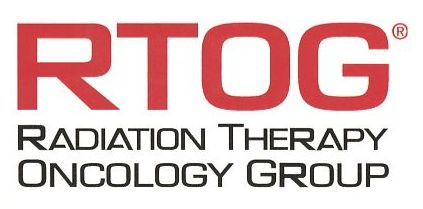zurück
Home |

aktuelles Emblem
|

früheres Emblem
|
allgemeines |
Führt mit Unterstützung der US-Regierung klinische
Studien zur Strahlentherapie bösartiger Tumoren durch. |
Gründung 1968. |
Bezeichnung |
Die Studien sind mit einer Jahreszahl und einer
laufenden Nummer gekennzeichnet. Hier eine Auswahl: |
| RTOG 10-05 |
Mammakarzinom RT nach Brusterhaltung: 25x 2Gy + sequ. Boost vs Hypofraktionierung + SIB (15F, 40/48Gy) |
| RTOG
06-17 |
NSCLC: 60Gy besser als 74Gy |
| RTOG 02-47 |
A randomized phase II study of neoadjuvant
capecitabine and irinotecan or capecitabine and oxaliplatin with concurrent
radiotherapy for patients with locally advanced rectal cancer (17). |
| RTOG 02-46 |
A phase II study of a paclitaxel-based
chemoradiation regimen with selective surgical salvage for resectable
locoregionally advanced esophageal cancer. |
RTOG 02-27 |
Phase I/II Study of Preirradiation
Chemotherapy with Methotrexate, Rituximab, and Temozolomid and
Postirradiation Temozolomid for Primary Central Vervous System Lymphoma. |
RTOG 01-28 |
Cervix: Celebrix (Anwendungsbeobachtung) |
RTOG 10-16 |
Nasopharynx: IMRT + Cisplatin versus Cetuximab |
RTOG 99-11 |
HNO-Tumoren: Radiochemotherapie bei Rezidiv nach
primärer Bestrahlung. |
RTOG 99-10 |
Duration of neoadjuvant total androgen supression
and radiotherapy in intermediate risk PCA. 28 Wochen Hormontherapie versus 8
Wochen vor RT.
|
RTOG 95-08 |
Hirnmetastasen: WBRT +- Stereotactic Radiosurgery |
RTOG 98-04 |
Durch eine Bestrahlung der Brust nach brusterhaltenden Behandlung von DCIS mit günstigen Risikoparametern kann die Rate von Lokalrezidiven gesenkt werden. Die Überlebensrate bleibt gleich. |
|
RTOG 9802 |
Eine PVC-Chemotherapie verbessert das PFS und
das OS einer postoperativen Bestrahlung von Gliomen Grad 2. |
RTOG 95-12 |
Stimmband-Ca: Hyperfraktionierung -
Standardfraktionierung |
RTOG 94-08 |
Verbessern 4 Monate Antiandrogen - Therapie das
Ergebnis der primären Strahlentherapie bei Prostatakarzinomen mit geringem und
mittlerem Risiko? |
| RTOG 93-11 |
Phase I-II radiation dose-escalation study in
patients with inoperable non-small-cell lung cancer (1). |
RTOG 93-10 |
ZNS - Lymphome: Chemotherapie, Bestrahlung |
RTOG 92-02 |
Prostata - Ca: RT, LTAD: long-term androgen -
deprivation |
RTOG 91-11 |
HNO RT +-Ch |
RTOG 91-12 |
Zervix - Ca |
RTOG 90-01 |
Zervix - Ca: pelvine RT + CDDP/5-FU vs pelvine und
paraaortale RT |
RTOG 90-03 |
HNO: primäre RT, unterschiedliche Fraktionierung |
RTOG 90-05 |
solitäre Hirntumoren: Gamma-Knife - LinAc |
RTOG 88-08 |
Bronchial - Ca: Chemotherapie, dann RT vs. RT |
RTOG 85-01 |
Ösophagus-Ca: RT + FU, Pt |
RTOG 85-15 |
ZNS Lymphom: nur RT |
RTOG 85-31 |
Androgen Suppression dann RT vs. RT |
| RTOG 75-06 |
Prostata-Ca (N+): RT Pelvis +- aortal
|
| RTOG 73-03 |
postoperative Bestrahlung bei fortgeschrittenen
HNO-Tumoren besser als praeoperative.
|
| RTOG 73-02 |
Strahlentherapie beim fortgeschrittenen NSCLC: 30Gy,
40Gy, 40Gy split course |
| Quellen |
1.) Werner-Wasik M, Swann RS, Bradley J.:
Increasing tumor volume is predictive of poor overall and progression-free
survival: Secondary analysis of the Radiation Therapy Oncology Group 93-11 phase
I-II radiation dose-escalation study in patients with inoperable non-small-cell
lung cancer.
Int J Radiat Oncol Biol Phys 70(2008):385–390
|
Teil von |
Radioonkologie: Organisationen |
Radioonkologie |
Onkologie |
 |

